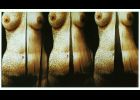Flusser était-il féministe? / Was Flusser a Feminist?
One would not spontaneously associate these two words, Flusser and feminism. Many testimonies point to Flusser’s machismo in his personal life: his relationship with Edith was rather traditional, one could even say patriarchal. But, while his personal behavior could not be qualified of feminist, the two texts, presented in this essay, point to a very modern and even somewhat revolutionary view of the relationship between men and women. The first one is his contribution to a book about love, edited by his friend Alexandre Bonnier; the second is his critique in European Photography of the work of the Greek photographer Lizzie Calligas. Flusser acknowledged forcefully that the adoption of a feminist point of view is an intellectual and moral necessity: by subjecting women’s bodies to their own bodies, men have criminally repressed women and prevented a dialogue in favor of a male monologue, thus making men and women strangers to each other, even though they may love each other. Such a point of view would force us to redefine the meaning of the word ‘love’.
Der maskierte Mensch: Vom Subjekt zum Projekt in der Stimmung des Orgasmus
This article starts from the assumption that Heidegger’s notion of Geworfenheit (Thrownness) can be overcome through alternative design or projection of human beings. Designing the body has so far received little attention within the research on Vilém Flusser. The essay begins with a discussion of bodily design moving on to an examination of sexual coitus and orgasm. Human re-invention is depicted in terms of sexual design, by assuming, in accordance with Flusser, a kind of sex, which is entirely independent of procreation or of any other biological consideration and exclusively directed towards orgasm as an intersubjective integration with the other person. This is not so much a form of surrender as an attempt at self-oblivion. The article also deals with the victory over death through orgasm, showing Flusser’s theoretical proximity to Wilhelm Reich’s psychoanalysis. The concept of orgasm will also be discussed in view of techno-imaginary charity as a gesture of love, addressing Flusser’s topos of masquerade, along with the possibilities of its overcoming.

